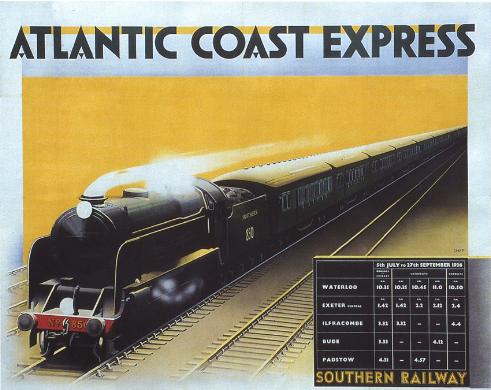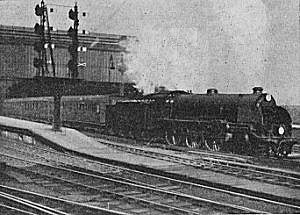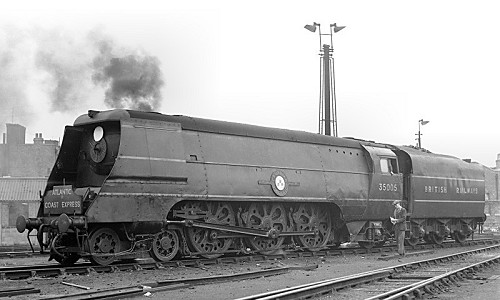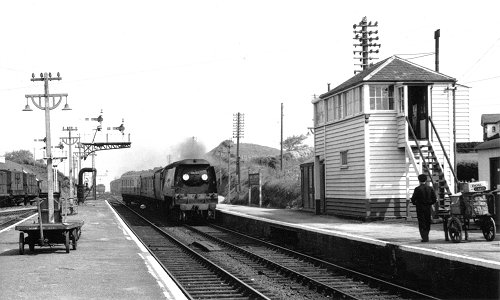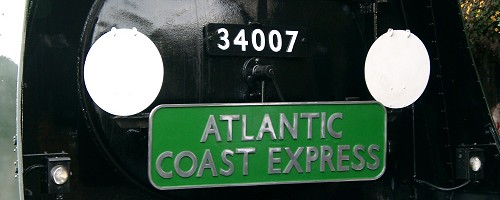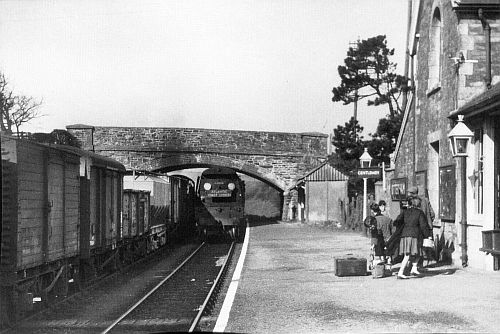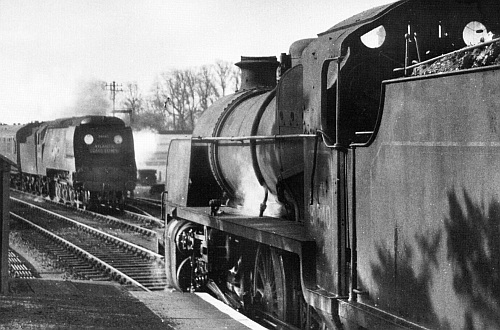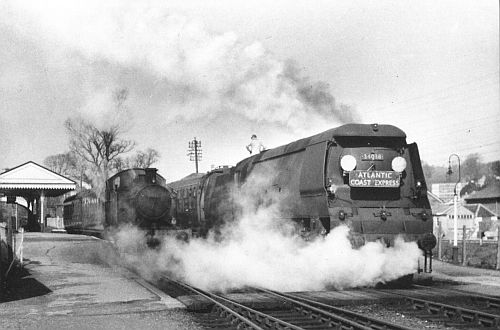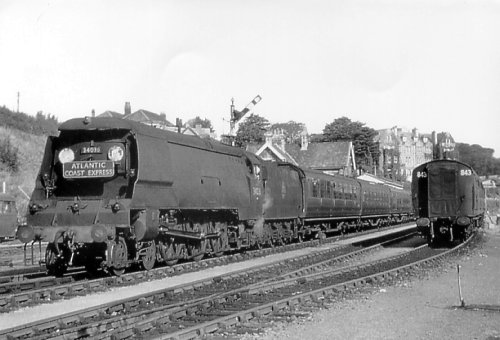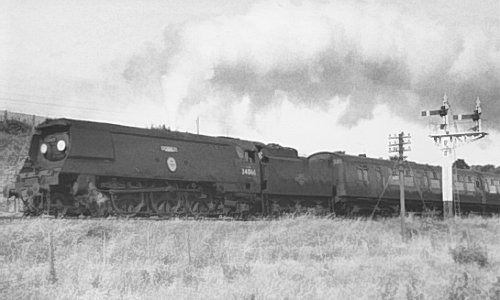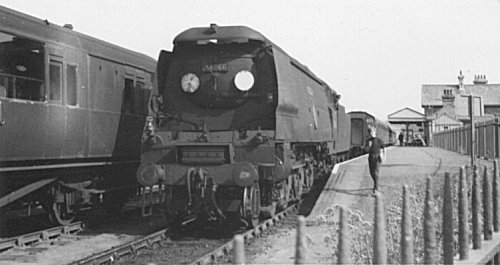The Atlantic Coast Express
The forerunner of the "Atlantic Coast Express" was the LSWR 11:00 am departure from Waterloo for Plymouth. This was quite a notable train in its day as, in 1904, it was running to Salisbury in 1 hr 32 mins, changing engines there, then on to Exeter in 1 hr 38 mins where, after another change of engine, it departed for the next booked stop, Devonport, where it arrived at 3:44 pm, followed by North Road, Mutley and finally Plymouth Friary at 4:05 pm. The LSWR advertised the service as non-stop from Exeter Queen Street to Devonport, though of course the GWR would never allow the train to pass through their St Davids station without stopping!
It was largely the success of this train that prompted the GWR to build two of its cut-offs, at Westbury and Castle Carey, to shorten its own route to London, then some 22¼ miles longer from Exeter. The LSWR supremacy, though, was not to be long-lived as in July 1904 the GWR intoduced the "Cornish Riviera Express" with its non-stop run from Paddington to Plymouth in 4 hrs 25 mins, some 19 minutes quicker than the LSWR train with all its stops and changes of engine.
No longer competitive on the time to Plymouth, the LSWR started adding extra stops, calling at Sidmouth Junction, North Tawton, Okehampton, Lydford and Tavistock, as well as acknowledging the stop at Exeter St Davids. Extra destinations were bolted on and with Plymouth no longer a competetive run, this portion became of secondary importance to the Ilfracombe portion and there were portions for Bideford, Bude and Padstow with through coaches detached for other places. Then in the late 1920s, by which time there were nine different destinations for parts of the train, came one of those PR masterstrokes for which the Southern Railway was known. A competition was held amongst staff to find a name for this many-destination train and one Guard Rowland of Woking came up with the winning suggestion, and the "Atlantic Coast Express" was born. The inaugral run under this name took took place on 19th July 1926, behind King Arthur class loco Nº779 Sir Colgrevance.
With the arrival of the Lord Nelson class locos through running from Waterloo to Exeter had been tried, but did not last for long and the Salisbury engine change was re-instated (though Wilton was used for the later "Devon Belle"). In 1939 timings were 1 hr 26 mins to Salisbury where five minutes were allowed for the change of engine, then on to Sidmouth Junction in 1 hr 23 mins and a further 18 mins to Exeter Central. Here the train was split and lighter engines took over portions for Ilfracombe and Torrington (split at Barnstaple Junction), Bude, Padstow and Plymouth (split at Okehampton and Halwill). Final arrival times for the 11:00 Waterloo departure were: Torrington 3:58 pm, Ilfracombe 4:05 pm, Plymouth Friary 4:19 pm, Bude 4:39 pm and Padstow 5:37 pm. All this ceased for the duration of WWII, though there was still a 11:00 am departure from Waterloo.
The ACE arriving at Otterham (above) behind West Country 34038
LYNTON on 21st April 1960 and the following day at St Kew Highway
(below) behind Battle of Britain 34085 501 SQUADRON, whilst N Class
31840 waits with a Padstow train.
The up ACE at Launceston headed by 34038 Lynton on 21st April 1960. Note the fireman on tender re-arranging the coal. Upon restoration of the "ACE" after the end of the war the railway now had its new Bulleid pacifics to call upon. The train would normally leave Waterloo behind a Merchant Navy which would go all the way to Exeter, though the stop at Salisbury was still required for water and a crew change, then a light pacific would take over for duties west of Exeter. Lack of proper maintenance during the war meant that initially schedules were slower than pre-war, but by the summer 1952 timetable timings had been reduced to lower than in 1939. Through the height of the summer season loadings were so great that the train would run in two portions, the main train left Waterloo at 11:00 am with portions for Ilfracombe, Torrington, Sidmouth and Exmouth whilst the relief train left at varying times just before or after this with portions for Bude, Padstow and Plymouth, also calling at Axminster to connect with the Lyme Regis branch. The up journeys were basically the reverse of the down with one exception, a through portion from Yeovil Town which called at all stations to Gillingham where it was added to the rear of the "ACE", also only a brief halt at Sidmouth Junction was required as the through coaches from Sidmouth were attached along with a coach from Seaton, to the preceding 10:30 am ex-Exeter service. During the late 1950s traffic could be so heavy on summer Saturdays that there was a succession of trains needed to carry all those wanting to travel to the Devon and North Cornwall resorts but by the early 1960s this traffic was in decline. As the private motor car became more reliable and affordable so the numbers travelling by train dropped off rapidly with the result that the last ever "ACE" ran on 5 September 1964. The "ACE" had no rival in the UK for the number of individual portions incorporated into one train, so much so that at times it almost seemed it consisted entirely of brake coaches! Leaving Waterloo a typical winter formation would be a second corridor and composite brake for Ilfracombe, composite brakes for each of Torrington, Padstow and Bude, second brake and composite for Plymouth, buffet, kitchen and open restaurant cars to be detached at Exeter, composite brakes for each of Exmouth, Sidmouth and all stations Salisbury to Honiton, the latter detached at Salisbury. One sad footnote to the "ACE" story concerns Guard Rowland who moved from Surrey to live in Torrington in Devon where he was unfortunate enough to become the only railwayman ever to be killed on the Halwill - Torrington line.
The up ACE, with a good head of steam for the long climb up to
Otterham, passing the Wadebridge East down home signals Numbers 7 and 8 (above).
The leading coach is a BSK from Bulleid five coach Set Nº833 and is
behind Battle of Britain 34066 SPITFIRE on 16th July 1964, and the
following day's down train (below) which has arrived at Padstow behind the
same engine. This was the steam locomotive that was involved in the Lewisham
accident on 4th December 1957.
|
| "ACE" timings summer Saturdays 1953 | ||||||||
| am | am | |||||||
| Waterloo dep: | 10:35 | 11:00 | ||||||
| Salisbury arr: | 12:05 | 12:31 | ||||||
| Salisbury dep: | 12:09 | 12:36 | ||||||
| Sidmouth dep: | 1:35 | |||||||
| Sidmouth Junc dep: | 2u10 | |||||||
| Exeter Central arr: | 1:55 | 2:28 | ||||||
| Exmouth arr: | 2:44 | 3:19 | ||||||
| Exmouth dep: | 12:15 | 1:45 | ||||||
| Exeter Central dep: | 1:59 | 2:34 | ||||||
| Exeter St Davids arr: | 2:04 | 2:39 | ||||||
| Exeter St Davids dep: | 2:07 | 2:39 | ||||||
| Eggesford | 3:15 | |||||||
| Barnstaple Junc arr: | 3:45 | |||||||
| Barnstaple Junc dep: | 3:49 | |||||||
| Barnstaple Town | 3:54 | |||||||
| Wrafton | 4:02 | |||||||
| Braunton | 4:07 | |||||||
| Morthoe | 4:27 | |||||||
| Ilfracombe arr: | 4:36 | |||||||
| Barnstaple Junc dep: | 3:56 | |||||||
| Fremington | 4:03 | |||||||
| Instow | 4:10 | |||||||
| Bideford | 4:16 | |||||||
| Torrington arr: | 4:30 | |||||||
| Halwill arr: | 3:07 | |||||||
| Halwill dep: | 3:14 | |||||||
| Dunsland Cross | 3:22 | |||||||
| Holsworthy | 3:32 | |||||||
| Whitstone & Bridgerule | 3:44 | |||||||
| Bude arr: | 3:54 | |||||||
| Halwill dep: | 3:09 | |||||||
| Launceston arr: | 3:29 | |||||||
| Launceston dep: | 3:36 | |||||||
| Tresmeer | 3:54 | |||||||
| Otterham | 4:05 | |||||||
| Camelford | 4:14 | |||||||
| Delabole | 4:23 | |||||||
| Port Isaac Road | 4:32 | |||||||
| Wadebridge arr: | 4:45 | |||||||
| Bodmin North arr: | 5:31 | |||||||
| Padstow arr: | 5:00 | |||||||
| Notes: | u | Calls to pick up only | ||||||
|
|
||||||||
